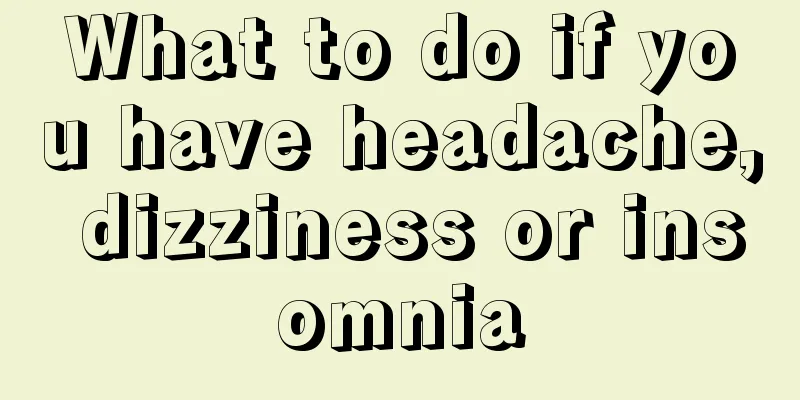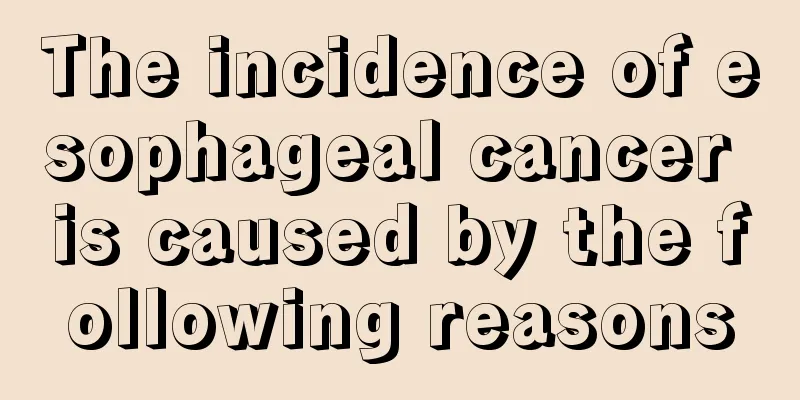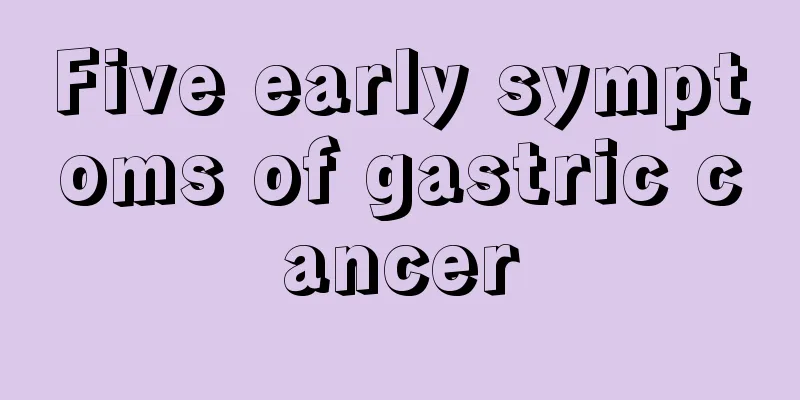What to do if you have headache, dizziness or insomnia

|
Disease is a situation that people often encounter in their daily life and work. Many factors in life can cause the occurrence of disease. Headache, dizziness and insomnia are very common situations. Generally, people will suffer from this situation due to excessive work pressure. However, many people who encounter this situation do not know how to treat it. So, what to do if you have headache, dizziness or insomnia? First, what should you do if you have headaches, dizziness and insomnia? There may be many reasons for insomnia, but they can be summarized into three aspects: One reason is long-term continuous mental work or continuous mental tension, which exceeds a person's load capacity, thus leading to a disorder of excitement and inhibition, and finally leading to insomnia. This problem can be divided into two aspects. On the one hand, objectively speaking, the amount of mental work that one person needs to complete is too large and the task is too heavy. For example, a student with a poor foundation suddenly has to accept too much new content and complete difficult assignments. It should be noted that if physical labor is too intense, it will be difficult to fall asleep at night, but general physical labor can promote sleep. Mental work is similar to this. If the brain is subjected to heavy tasks for a long time, it will be difficult to calm it down at night and insomnia is inevitable. On the other hand, it is also related to the tolerance of a person's nervous system. A person's physical condition is good or bad. Some people are strong and can bear heavy physical labor for a long time without feeling tired. Some people are thin and frail and cannot even tie a chicken. They will be exhausted after a little activity. The functions of the human nervous system, like physical strength, also have different strengths. Some people may be physically strong but have weak brains. Not only do they function slowly, but they are also easily overloaded and prone to disorders. The second reason is caused by strong stimulation. For example, some patients become ill due to the death of their relatives, while others suffer from insomnia due to failure in the college entrance examination. Of course, everyone reacts differently to the same thing. Some people think it is a catastrophic disaster and are greatly shocked, while others do not react strongly. This shows that cognitive factors play an important role. Therefore, it is very important to improve your self-cultivation and correctly view the events happening around you in order to prevent insomnia and maintain good health. The third reason is sleep cycle disorder. We often encounter such patients in school. They complain that they start to feel sleepy when they have class at 8 a.m., and their minds start to become clear around 11 a.m. They have difficulty falling asleep at noon and feel groggy in the afternoon. Their minds start to become clear again after 9 p.m. and they cannot fall asleep before noon. Physical therapy and repetitive transcranial magnetic stimulation are currently a new type of non-drug treatment for insomnia. They can be combined with drug treatment to quickly block the occurrence of insomnia. They are particularly suitable for the treatment of insomnia in women during breastfeeding, especially insomnia caused by postpartum depression. Second, intervention measures for insomnia mainly include drug treatment and non-drug treatment. Emphasize the importance of sleep health education, that is, to carry out psychological behavioral therapy, drug therapy and traditional medicine treatment on the basis of establishing good sleep hygiene habits. [General treatment] 1. Psychological and behavioral therapy. The effective psychological and behavioral treatment method for insomnia is mainly cognitive behavioral therapy (CBT-I). Psychological and behavioral therapy has a good effect on primary and secondary insomnia in adults, and usually includes sleep hygiene education, stimulus control therapy, sleep restriction therapy, cognitive therapy and relaxation therapy. These methods are used alone or in combination to treat primary or secondary insomnia in adults. What should you do if you have headaches, dizziness and insomnia? To treat frequent insomnia, you should do the following: Cognitive adjustment: Use relevant knowledge about sleep to explain and guide friends with insomnia, so that they can better understand sleep and reduce irrational cognition, fear and anxiety about sleep. Behavioral therapy: Behavioral therapy mainly involves relaxation training to relieve the patient's tension and anxiety. Hypnotherapy for insomnia is the application of certain hypnosis techniques to put people into a hypnotic state. |
<<: What to do if you can't sleep all night
>>: Can sour jujube leaves cure insomnia?
Recommend
These infectious skin diseases must be prevented!
Skin disease is a relatively common disease. It i...
If your appetite suddenly increases, beware of these four diseases
It is said that being able to eat is a blessing, ...
Analysis of the best treatment for osteosarcoma
Osteosarcoma mainly occurs in young people or chi...
What causes low platelets?
There are certainly reasons for low platelet coun...
Effects and methods of apple and pear lean meat soup
Apples have the effect of promoting salivation an...
How long does it take to recover from laser treatment of pigmentation
There are many factors that cause pigmentation. I...
How does skin cancer spread
Not everyone can have a healthy life, there is al...
Long press an acupuncture point to change your bad temper
People who are usually angry and can't find a...
Can female bladder cancer be cured?
Can female bladder cancer be cured? Bladder cance...
Can I drink ginkgo soaked in water for a long time?
There are often many unnecessary troubles and com...
Things to note after soaking your feet
After soaking our feet, we need to dry the soles ...
What medicine should I use for blurred vision
Eyes are windows to the soul. If there is a probl...
What are the differences between tampons and sanitary napkins
Sanitary napkins are a kind of physiological prod...
What should you pay attention to when you have lung cancer? Dietary considerations for lung cancer patients
In fact, many diseases are related to many factor...
How long after trigeminal nerve surgery can I wash my hair
For trigeminal nerve problems, some patients will...









